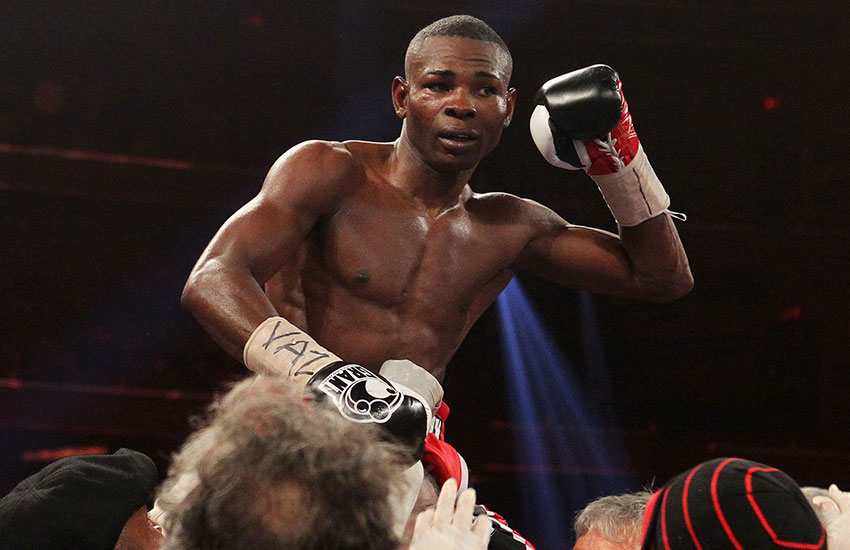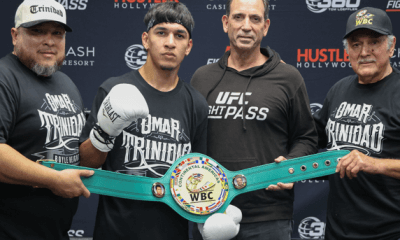Featured Articles
The Jackal and Other Boxing Nicknames Lost in Translation

Just like “bad” and “dope” can mean “good,” words in Spanish often take on double meanings when they’re adopted into slang or used colloquially. When boxers choose one of these words as a nickname, care must be taken when translating the nicknames into English, lest we have “dopes” being called “dummies” and “rebels” being called “puppets.”
El Chacal, the nickname used by Guillermo Rigondeaux (pictured), does indeed mean jackal, that wild animal that resembles a coyote. But it has also taken on a second meaning in Spanish-speaking communities. It means “The Boss,” as in someone who is running things, either on the streets, or, in the ring. The slang use is derived in part from the movie, Carlos el Terroista, which is based on the1970s terrorist, Carlos El Chacal, who got his name when authorities found the book, The Way of the Jackal, among his belongings. The streets have adopted the use of Chacal much the same way they adopted lingo from other movies and many who use the word do so without any knowledge of its origins. When someone calls himself Chacal, he could be inspired by the movie, or it could be his way of telling you that he’s a bad ass.
In Latin America, much like the United States, dialects and expressions have developed that are unique to specific areas. Just as someone on Fordham Road in the Bronx might not know that “tennies” refers to “kicks” or sneakers, and that pop means soda, the word Titere has different meanings depending on the region. Officially, it means puppet. But the streets have redefined the word. On the East Coast, in predominantly Puerto Rican neighborhoods, a Titere is a hoodlum, someone standing at the entrance of corner Bodegas sizing guys up for a fight and romancing passing women with vulgar remarks about their booties. Out West, in mostly Mexican and Central American communities, a Titere is an outlaw, a “gangsta.” While junior welterweight contender Miguel Vazquez might use it because of his herky-jerky style, keep in mind the next time you see a boxer introduced as “El Titere” that he might be calling himself a rebel and not one of those dolls with the goofy faces, strings tugging at their arms and legs.
Morocho is another of those words with differing regional meanings. In some parts it means dark haired, in others it’s a dish of food. In Venezuela, where former champion Carlos Hernandez was from, it means something else. Last year, when various websites reported his death, his nickname was translated as the dark-haired one. The Wikipedia entry on him explains his nickname is because of “the peculiarity of being dark-haired.” There’s nothing peculiar about dark hair in Latin America. Hernandez did have dark hair, but his nickname stems from the Venezuela definition of the word morocho, which is a name given to someone who is a twin.
Matador has become an English word, one with a very different meaning from the original Spanish definition. The word comes from matar, to kill, and means killer. In the bullfighting arena, a Matador is the last of the toreros, the one who slays the beast. He’s the one who gets all the glory, his fame, and the top billing. But a matador is part of a cuadrilla, a team of bullfighters that includes any combination of picadors, flagmen, peons, and swordsmen. The team weakens the bull for the final stage, when the killer comes out to put the animal out of its misery. When you see an aggressive fighter with a big punch from a Spanish-speaking country billed as a matador, like Jesus Chavez or Ricardo Mayorga, it makes more sense to think of the Spanish meaning, a killer, rather than a sleek boxer, such as Pernell Whitaker.
It’s not just the slang words that are lost in translation. Some nicknames don’t translate well because of usage. Take El Finito, for example. Used by the exquisite Ricardo Lopez, the name does translate as “The Fine One.” But the use of “fine” in Spanish differs greatly from the English usage. While in English, a car such as the Kia Forte, with its low price, good fuel economy, and versatile hatchback design, can be described as a fine car, in Spanish the use of fine is reserved for exotic, high-end makes such as Lambos and Ferraris. While “The Fine One” is a proper translation, it doesn’t do the fighter the same justice as it does in Spanish.
Other nicknames don’t translate well simply because they may not be Spanish. Take hard-hitting Mexican welterweight Jose “Pipino” Cuevas. His nickname, easily confused with the Spanish “pepino,” which means cucumber, was not taken after a food. It’s not even a Spanish word. Cuevas took that name as a tribute to his Italian grandfather, who was named Pipino.
Chiquita does mean little one, but it would never be used for a male or anything masculine. Humberto Gonzalez was not called that because of his height, a mistake even the LA Times made. When he turned pro, he chose to advertise his parent’s butcher shop, the little butcher shop, on his trunks. The name stuck.
So, if you ever find yourself wondering why a foreign boxer has a nickname that seems to make little sense when translated into English, consider that the true meaning might have been lost in translation. As for Rigondeax, when I reached out to a representative of his to ask about his nickname, he began by asking if I was Cuban and questioned why Cuban fighters get such little press. Some of the leading contenders in the world are Cuban, he said, citing Rigondeaux, Luis Ortiz and Erislandy Lara. They’re overlooked, he lamented, by both the press and other fighters and added that Rigo has been campaigning for a fight against Lomachenko and Ortiz has been trying to get Deontay Wilder into the ring, but, in both cases, to no avail.
Then I asked him about Rigondeaux’s nickname and if he was referring to that wild canid in the Serengeti that chews on lion and hyena scraps, or, if he meant the other meaning, the one the streets have adopted. There’s no dog in Rigondeaux is what he told me.
Check out more boxing news and features at The Sweet Science, where the best boxing writers write.
-

 Featured Articles3 weeks ago
Featured Articles3 weeks agoThe Hauser Report: Zayas-Garcia, Pacquiao, Usyk, and the NYSAC
-

 Featured Articles2 weeks ago
Featured Articles2 weeks agoOscar Duarte and Regis Prograis Prevail on an Action-Packed Fight Card in Chicago
-

 Featured Articles1 week ago
Featured Articles1 week agoThe Hauser Report: Cinematic and Literary Notes
-

 Book Review4 days ago
Book Review4 days agoMark Kriegel’s New Book About Mike Tyson is a Must-Read
-

 Featured Articles4 weeks ago
Featured Articles4 weeks agoManny Pacquiao and Mario Barrios Fight to a Draw; Fundora stops Tim Tszyu
-

 Featured Articles4 weeks ago
Featured Articles4 weeks agoArne’s Almanac: Pacquiao-Barrios Redux
-

 Featured Articles3 weeks ago
Featured Articles3 weeks agoRemembering Dwight Muhammad Qawi (1953-2025) and his Triumphant Return to Prison
-

 Featured Articles4 weeks ago
Featured Articles4 weeks agoOleksandr Usyk Continues to Amaze; KOs Daniel Dubois in 5 One-Sided Rounds


















